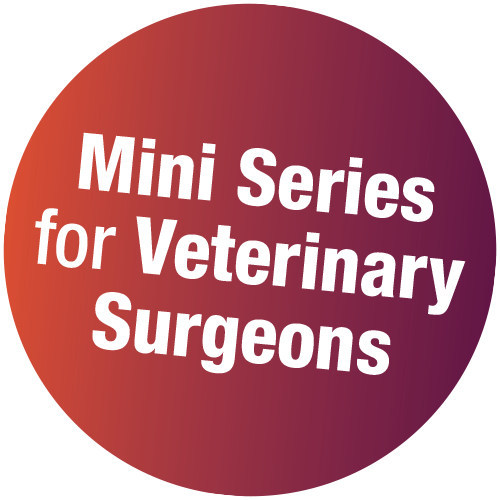MS240 – Veterinary Treatment of UK Wildlife Casualties
£447.00 (+VAT)
12 months access to recordings and course materials is included. Please note that these are webinar recordings and not live events. Full details on how to access the Mini Series will be emailed to you.
- Join Emma Keeble BVSc MRCVS,Dip Zoo Med (Mammalian)for three 2-hour online sessions
- This mini-series will give an over view of the care and treatment of inured UK wildlife species from point of capture through transportation to the veterinary clinic, triage and initial assessment, euthanasia, first aid and emergency care, hospitalisation, diagnostics, treatment, rehabilitation and eventual release back to the wild. An initial introductory session will discuss the legal and ethical implications involved in treating wild animals and discuss the decision making process involved in the triage of wildlife cases. Two further sessions will look at the veterinary care, including handling, hospitalisation and nutrition, of firstly mammal and secondly avian wildlife species and discuss the diagnosis and treatment of common presenting conditions in these wild animals.
- Comprehensive notes to downloaded
- Self-assessment quizzes to ‘release’ your 8 hours CPD certification (don’t worry, you can take them more than once if you don’t quite hit the mark first time)
- A whole year’s access to recorded sessions for reviewing key points (and in case you miss a live session!)
- Superb value for money – learn without travelling
- Watch the recordings on your iPad!
Programme
Session 1
Introduction to Wildlife Medicine – ethical and legal considerations, first aid and emergency care, triage and treatment.
The first webinar in the miniseries will outline the process of triage and general principles of first aid involved when presented with an injured wild animal. The decision making process to determine whether to treat or euthanase the wildlife casualty will be discussed, including ethical and legal implications. Initial assessment, methods of euthanasia and emergency care, including fluid and nutritional therapy, therapeutics, bandaging and fracture management will also be included to give a basic grounding in how to examine, triage and provide emergency care to wild animal casualties. Rehabilitation and release methods will be briefly discussed.
Learning objectives:
- Describe the triage process.
- Discuss the welfare decisions required when treating and rehabilitating wildlife.
- List some of the important UK wildlife legislation and how it affects decisions regarding the veterinary treatment of wildlife.
- Outline the general principles of first aid in the treatment of wild animals]
- Know how and when to euthanase humanely the common wildlife species encountered
- Briefly list the main principles and methods of wildlife rehabilitation and release
Veterinary care of mammal casualties and commonly encountered conditions
The second webinar in the miniseries will discuss how to safely handle and examine injured mammals brought to the veterinary practice, as well as their initial management in captivity (short term housing, nutritional requirements and zoonoses). It is assumed that wild animals will not be rehabilitated at the practice for more than a few days and that after initial stabilisation, they will be transferred to a wildlife rehabilitation centre for long term specialist care. Common species will be covered such as hedgehogs, foxes, badgers, bats and deer, with some reference to the more unusual species such as marine mammals and otters. Basic principles of hand-rearing neonatal mammals will also be discussed. The diagnosis, treatment and management of presenting conditions encountered in the commonly seen species of wild mammal in the UK will be outlined.
Learning objectives:
- Be able to identify suitable housing and welfare needs for common wildlife casualty mammal species.
- Know appropriate short-term diets for the main mammal species encountered.
- Identify the risks to human health from mammal wildlife casualties.
- List the basic principles of hand rearing wild neonatal mammals
- List some of the common conditions and diseases seen in UK wildlife mammal species and their diagnosis and treatment
Veterinary care of avian casualties and commonly encountered conditions
This final webinar in the series will discuss how to safely handle and examine injured avian species brought to the veterinary practice. This widely diverse group of animals will cover those species most commonly encountered in veterinary practice such as gulls, pigeons, songbirds, birds of prey and waterfowl. Their initial management in captivity will be outlined (short-term housing, nutritional requirements and zoonoses). It is assumed that wild animals will not be rehabilitated at the practice for more than a few days and that after initial stabilisation, they will be transferred to a wildlife rehabilitation centre for long term specialist care. Basic principles of hand-rearing neonatal birds will also be covered, with reference to the most common species seen (songbirds, pigeons and gulls). The diagnosis, treatment and management of common presenting conditions encountered in the main groups of wild birds in the UK will be outlined.
Learning objectives:
- Be able to identify suitable housing and welfare needs for common wildlife casualty avian species.
- Know appropriate short-term diets for the main avian species encountered.
- Identify the risks to human health from avian wildlife casualties.
- List the basic principles of hand rearing wild neonatal birds
- Know some of the common conditions and diseases seen in UK wildlife avian species and their diagnosis and treatment
The price includes all 3 sessions, notes and quiz – 8 hours of CPD
*No traffic jams, accommodation hassles, pet or childcare, rota clashes, locum fees ……….. just great CPD and a valuable ongoing resource.
Course Feedback :
“The content of the Mini Series will help me very much in my work in practice. I have much more knowledge of caring for wildlife now.”
“I enjoyed it and enjoyed being able to do at my own pace. It’s much easier to do the webinars when I have quiet time at home or in practice.”
“The content of the Mini Series will help me very much in my work in practice. I now have alot more knowledge of caring for wildlife.”



